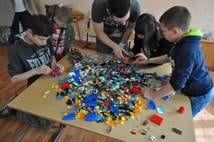Be honest and do not hide your emotions: tips for volunteers who go to the orphanage
What do volunteers who are going to meet children in an orphanage need to know?
REMEMBER: THESE CHILDREN GROW UP WITHOUT PARENTS, AND THEY HAVE FEATURES THAT THEIR PEOPLE WHO GROW UP IN FAMILIES DO NOT HAVE.
Every child in the first years of life develops an attachment - to mom, dad, close relatives. Then this commitment helps her build relationships with other people and thus prepares her for adulthood. The peculiarity of orphans is that they have a violation of attachment - it was not properly formed. This seriously affects their behavior, so it is necessary to perceive all the words and actions of such children, given this feature. For example, a child may immediately rush to your neck and say that he loves you. Thus, she tries to compensate for the lack of attention, without realizing that such behavior is not quite normal. If a child behaves this way with you, you should not immediately respond to her with mutual hugs and vows of love. It will be about the same as feeding a diabetic sugar - you will only worsen the child’s attachment. Remember this feature and follow the necessary boundaries. TREAT CHILDREN AS EQUAL
TREAT CHILDREN AS EQUAL
Build communication with them as adults. Of course, they are much younger than you, they are lonely, and therefore somewhat defenseless. But by showing excessive care and looking at the child from top to bottom, you thereby give up and put yourself in an awkward position: it will be harder for you to refuse her. But it should be understood that such children have developed the ability to manipulate instead of healthy communication skills. So, they can easily use your feelings and desire to protect them: for example, ask to take them home or give them your phone, jewelry, notebook ...
If you treat these children as equals, you will be easier to say they "no".

REMEMBER THAT IN YOUR RELATIONSHIP ADULT - YOU
come to the children to show them what healthy contact is (remember that they lack it!), And all the responsibility lies with you. You must follow the order and find an approach to children in any difficult situation.
And it is you, the adult, who is responsible for how your relationship develops. Ideally, your rapprochement should be slow and respectful of personal boundaries.
BE HONEST AND DON’T HIDE YOUR EMOTIONS
In your boundless desire to help children, don’t forget about yourself. Speaking "I" when communicating with children, you do not show yourself selfish. "I-message" is an effective way to prevent conflict and again establish healthy contact. For example, if a child asks you for the tenth time if you can take him or her home with you, don’t be afraid to be honest and say, “When you ask me the same thing so many times, I get annoyed. Please don’t do that. " It will be better if you keep silent about your negative emotions and accumulate them.
If something in the child’s behavior is unacceptable and unpleasant to you - for example, a teenager violates your personal space by touching you - you also need to give feedback. Say that you can’t do this with strangers, it’s only possible with close people or relatives. And with you as a volunteer, it is better for him to stick to the border.
DON’T BE AFRAID TO MAKE MISTAKES
Mistakes are a new field for interaction. Children will not condemn you for a mistake, but it will be a valuable experience for them: they will understand that a mistake is normal, they will see an example of its implementation and correction. And this is another example of healthy contact for children deprived of it.
In addition, this will make your image, the image of a volunteer, perhaps idealized by the child’s imagination, closer to reality: she will understand that you are just a person who can experience different emotions (including negative ones) and act differently. including incorrect). This will help the child learn to build relationships with different people and prepare him for adulthood.
Read also: Nowhere without vaccinations: children’s vaccinations and advice before vaccination are
REMEMBER: THESE CHILDREN GROW UP WITHOUT PARENTS, AND THEY HAVE FEATURES THAT THEIR PEOPLE WHO GROW UP IN FAMILIES DO NOT HAVE.
Every child in the first years of life develops an attachment - to mom, dad, close relatives. Then this commitment helps her build relationships with other people and thus prepares her for adulthood. The peculiarity of orphans is that they have a violation of attachment - it was not properly formed. This seriously affects their behavior, so it is necessary to perceive all the words and actions of such children, given this feature. For example, a child may immediately rush to your neck and say that he loves you. Thus, she tries to compensate for the lack of attention, without realizing that such behavior is not quite normal. If a child behaves this way with you, you should not immediately respond to her with mutual hugs and vows of love. It will be about the same as feeding a diabetic sugar - you will only worsen the child’s attachment. Remember this feature and follow the necessary boundaries.
 TREAT CHILDREN AS EQUAL
TREAT CHILDREN AS EQUAL Build communication with them as adults. Of course, they are much younger than you, they are lonely, and therefore somewhat defenseless. But by showing excessive care and looking at the child from top to bottom, you thereby give up and put yourself in an awkward position: it will be harder for you to refuse her. But it should be understood that such children have developed the ability to manipulate instead of healthy communication skills. So, they can easily use your feelings and desire to protect them: for example, ask to take them home or give them your phone, jewelry, notebook ...
If you treat these children as equals, you will be easier to say they "no".

REMEMBER THAT IN YOUR RELATIONSHIP ADULT - YOU
come to the children to show them what healthy contact is (remember that they lack it!), And all the responsibility lies with you. You must follow the order and find an approach to children in any difficult situation.
And it is you, the adult, who is responsible for how your relationship develops. Ideally, your rapprochement should be slow and respectful of personal boundaries.
BE HONEST AND DON’T HIDE YOUR EMOTIONS
In your boundless desire to help children, don’t forget about yourself. Speaking "I" when communicating with children, you do not show yourself selfish. "I-message" is an effective way to prevent conflict and again establish healthy contact. For example, if a child asks you for the tenth time if you can take him or her home with you, don’t be afraid to be honest and say, “When you ask me the same thing so many times, I get annoyed. Please don’t do that. " It will be better if you keep silent about your negative emotions and accumulate them.
If something in the child’s behavior is unacceptable and unpleasant to you - for example, a teenager violates your personal space by touching you - you also need to give feedback. Say that you can’t do this with strangers, it’s only possible with close people or relatives. And with you as a volunteer, it is better for him to stick to the border.
DON’T BE AFRAID TO MAKE MISTAKES
Mistakes are a new field for interaction. Children will not condemn you for a mistake, but it will be a valuable experience for them: they will understand that a mistake is normal, they will see an example of its implementation and correction. And this is another example of healthy contact for children deprived of it.
In addition, this will make your image, the image of a volunteer, perhaps idealized by the child’s imagination, closer to reality: she will understand that you are just a person who can experience different emotions (including negative ones) and act differently. including incorrect). This will help the child learn to build relationships with different people and prepare him for adulthood.
Read also: Nowhere without vaccinations: children’s vaccinations and advice before vaccination are